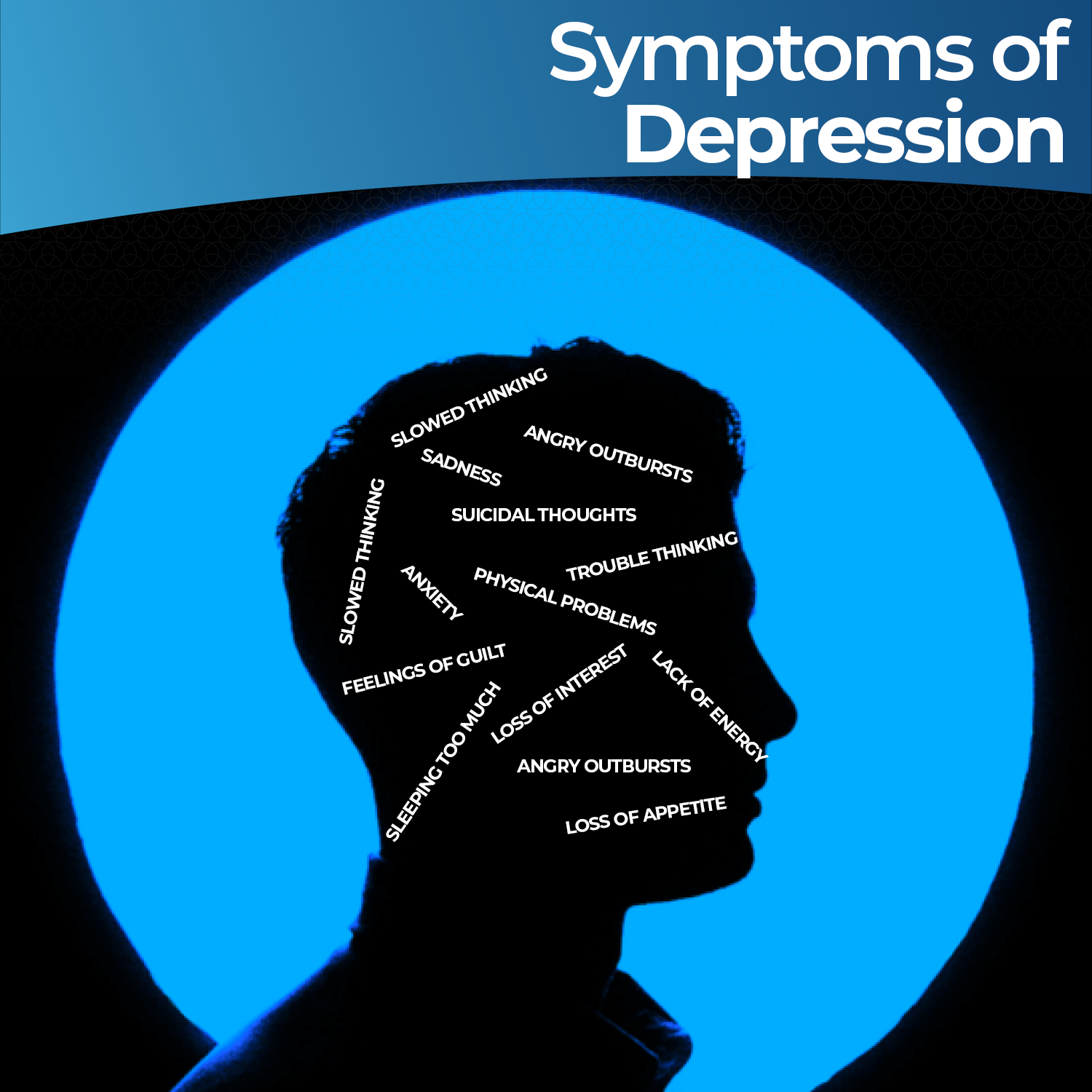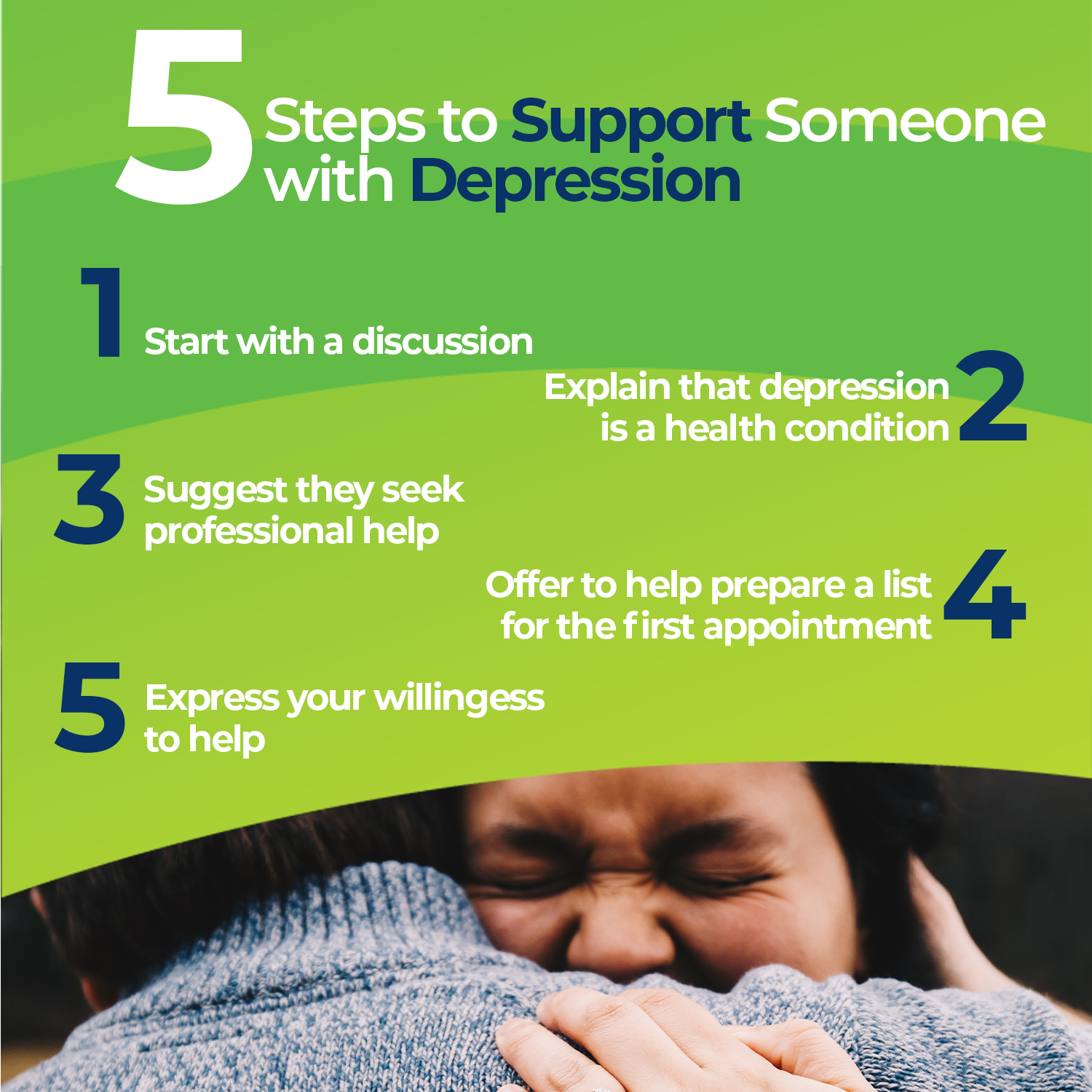How to Support Someone with Depression
How to Support Someone with Depression
.png)
Depression is one of the most common mental health conditions in the world. It can affect almost every aspect of a person’s life, including sleep, work, relationships, and exercise.
Depression often does not make sense to those who have never experienced it. Because of that, friends and family members are often ignorant about how they can help their loved ones.
Helping someone struggling with depression can be difficult. If you see a loved one struggling, you may feel helpless or confused about what you can do.
The first step towards helping a loved one with depression is learning the symptoms and how people with depression respond to stressors.
What effect does seasonality have on mental health? Find out more here!
In this post, we will explain what depression is, how you can support your loved ones and the risk factors for worsening depression, and how to prevent suicide.

What is Depression?
Mental health topics are no longer taboo. Today people can often discuss their mental struggles and seek support.
However, many people still do not understand most mental health conditions, including depression. Tactics people think work to combat depression can sometimes worsen symptoms
What are the symptoms of depression?
- Feelings of sadness, tearfulness, emptiness, or hopelessness
- Angry outbursts, irritability, or frustration, even over trivial matters
- Frequent or repeated mentions of not wanting to live, suicidal thoughts, suicide attempts
- Trouble thinking, concentrating, making decisions, or remembering things
- Feelings of worthlessness or guilt, focusing on past failures, or blaming yourself for things that aren’t your responsibility
- Slowed thinking, speaking, or body movements
- Anxiety, restlessness, or nervousness
- Physical problems that cannot be explained like back pain, headaches, or other issues
- Reduced appetite and weight loss or increased appetite and weight gain
- Sleeping too little or too much
- Tiredness and lack of energy, so even small tasks take extra effort
- Loss of interest or pleasure in most normal activities like sex, hobbies, or sports
A person with depression may have all these symptoms, or they may have one or two. However, for people with depression, symptoms can affect daily activities including work or school.
Depression also affects social activities and relationships with others. Some people may feel generally miserable without knowing why.
It is important to note that in children and teenagers, depression can manifest itself with cranky or irritable behavior rather than sadness or despair.
At-home therapeutic practices can make depression more manageable. Learn more here!

What Can I Do to Support Someone with Depression?
The best thing you can do to help someone with depression is to encourage them to seek professional help. Remember that people with depression may not be able to recognize or acknowledge their symptoms. They may also have difficulties asking for help.
Take these five steps to encourage your loved one to get help.
Start with a discussion. Do not confront your loved one. Gently tell them what you've seen in them and why you're worried about it.
Explain that depression is a health condition. There still is some taboo around depression. Explain that it is not a personal flaw or weakness, depression often improves with treatment.
Suggest that they seek professional help. Healthcare providers like general physicians or family practice physicians are a good place to start. You can also see a mental health provider such as a licensed counselor or psychologist.
Offer to help prepare a list for the first appointment. People suffering from depression often struggle to know where to begin and because of that they often dread going to therapy. Offer to help prepare a list of discussion points for the first appointment with the healthcare or mental health provider.
Express your willingness to help. Offer to help set up appointments, go along with them to sessions, or offer to attend family or group therapy sessions.
For people with severe or life-threatening depression, contact a health care provider, a mental health provider, or emergency medical services.
What are the Risks of Suicide? How do I Help?
The worst cases of depression can result in suicide attempts or suicide. Because of this, depression is very much a life-threatening condition and one that must be addressed seriously before it progresses to such dire results.
Below we have assembled risk factors that could lead to suicide because of depression.
- Mental disorders, particularly mood disorders, schizophrenia, anxiety disorders, and certain personality disorders
- Alcohol and other substance use disorders
- Hopelessness
- Impulsive and/or aggressive tendencies
- History of trauma or abuse
- Major physical illnesses
- Previous suicide attempt(s)
- Family history of suicide
- Job or financial loss
- Loss of relationship(s)
- Easy access to lethal means
- Local clusters of suicide
- Lack of social support and sense of isolation
- The stigma associated with asking for help
- Lack of healthcare, especially mental health and substance abuse treatment
- Cultural and religious beliefs, such as the belief that suicide is a noble resolution of a personal dilemma
- Exposure to others who have died by suicide (in real life or via the media and Internet)
These are the major risk factors that make it more likely that someone will consider, attempt, or die by suicide. They cannot cause or predict a suicide attempt, but they are still important to be aware of.
In addition to the risk factors above, there are warning signs that a suicide attempt may be imminent.
Below are the warning signs that someone may attempt suicide. Look out for these behaviors, especially if they are new, increasing, or seem related to a painful event, loss, or change. If you or someone you know exhibits any of these behaviors, seek professional help immediately.
- Talking about wanting to die or to kill themselves
- Looking for a way to kill themselves, like searching online or buying a gun
- Talking about feeling hopeless or having no reason to live
- Talking about feeling trapped or in unbearable pain
- Talking about being a burden to others
- Increasing the use of alcohol or drugs
- Acting anxious, agitated, or behaving recklessly
- Sleeping too little or too much
- Withdrawing or isolating themselves
- Showing rage or talking about seeking revenge
- Extreme mood swings
Talking to people you trust about your mental health is important. Learn more about the importance of mentors here.
Child Focus is Here to Help You Address Your Mental Health
Depression is a serious condition, and it can result in suffering or even death of you or your loved ones. If your depression has become unmanageable or you are worried about the wellness of a loved one, it is time to seek professional help.
Child Focus is here for you regardless of your age or the severity of your mental health conditions. We provide individual and family therapy to address a wide variety of mental health and interpersonal issues, including depression.
If you need mental health support, reach out to Child Focus for help today!
Alcohol or substance use disorders can be prevalent in individuals with depression. For help with SUD, refer to our substance use services here.
For more free content on mental health, early childhood education, and family relationships, follow Child Focus on Facebook, Instagram, and LinkedIn.
Are you satisfied with the difference Child Focus has made in your life? Leave us a quick review here!
